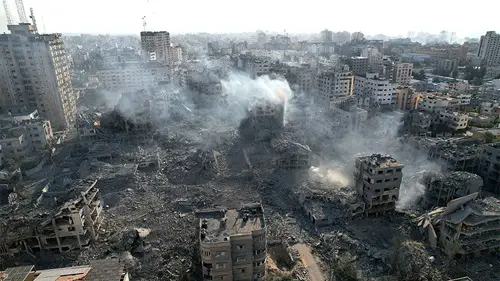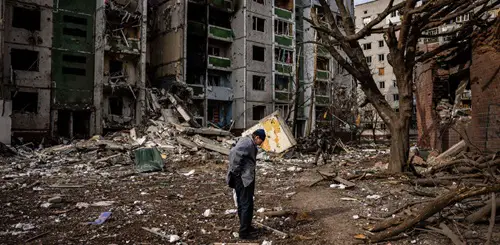|
TRANSLATE THIS ARTICLE
Integral World: Exploring Theories of Everything
An independent forum for a critical discussion of the integral philosophy of Ken Wilber
  Frank Visser, graduated as a psychologist of culture and religion, founded IntegralWorld in 1997. He worked as production manager for various publishing houses and as service manager for various internet companies and lives in Amsterdam. Books: Ken Wilber: Thought as Passion (SUNY, 2003), and The Corona Conspiracy: Combatting Disinformation about the Coronavirus (Kindle, 2020). Frank Visser, graduated as a psychologist of culture and religion, founded IntegralWorld in 1997. He worked as production manager for various publishing houses and as service manager for various internet companies and lives in Amsterdam. Books: Ken Wilber: Thought as Passion (SUNY, 2003), and The Corona Conspiracy: Combatting Disinformation about the Coronavirus (Kindle, 2020). 
Destruction in Gaza after Israeli airstrikes. (The Moscow Times)
Palestine or UkraineIs There Any Difference?Frank Visser
International law should be upheld for all the countries in the world, without exception.
I just watched the gruesome Oscar winning documentary "Twenty Days in Mariupol", and was wondering why humanity keeps creating these atrocities, again and again. The senseless destruction of human lives, infrastructure and future prospects is apalling, not to mention the lasting feelings of hatred between the two countries. What could possibly be the aim of these military adventures? It also struck me that there is a one-on-one similarity with the situation in Gaza, for the following reasons:
TAKING POSITIONSNow I noticed something odd when surveying the positions taken regarding these two wars. When an observer is pro-Western, he or she will usually take the side of Israel and Ukraine (both are considered, within wide margins, to be "Western"). In contrast, an anti-Western observer will side with Russia (or at least be sympathetic towards the Russian perspective) and Hamas (or at least the plight of the Palestinian people). So the attitude towards the "West" seems to be the deciding factor here. Whitewashing happens on both sides.
Both Zelensky and Putin follow this logic: Zelensky sides with Israel, Putin with Hamas, as predicted by this model. Hamas and Russia are the "same evil, and the only difference is that there is a terrorist organization that attacked Israel and here is a terrorist state that attacked Ukraine," Zelensky said in a speech to NATO's Parliamentary Assembly on Oct. 9. (Washington Post) Putin, say Russian and Western policy experts, is trying to use Israel's war against Hamas to escalate what he has cast as an existential battle with the West for a new world order that would end U.S. dominance in favour of a multilateral system he believes is already taking shape. (Reuters) But there definitely are more logical options, one less ideological and more humanistic, the other more power-oriented.[1]
Alternative presentation as a quadrant:
The third position seems morally superior to me. For both Ukraine and Palestine are faced with a hugely stronger opponent, in both cases (former) superpowers like Russia and US/Israel. Both do not have the weapons to beat their opponents, and both are dependent on support from other countries (in the case of Ukraine: Europe and the US; in the case of Hamas: Iran). Would it not make more sense to side with those who are at a disadvantage in these unequal war situations? (Note: For completeness sake I have added a fourth option: pro-Israel and pro-Russia, a support for the powerful nations in their own area. This could be justified to maintain stability in otherwise volatile regions of the world. Or there could be Christian motives for such a position.)

Russian 'dumb bomb' air strike killed civilians in Chernihiv (Amnesty)
DOUBLE STANDARDSMany commentators around the world have noticed a double standard in the Western response to the Ukraine war and the Gaza war. Whereas Ukraine was quick to receive funds and weapons from various Western countries, there was much less uproar in the Western media about the policies of Israel compared to those of Russia—though this seems to change. Is it hypocrisy? Racism? A gut feeling regarding the so-called "clash of civilisations"? Just a few random hits that came up when searching for "UKRAINE PALESTINE double standards". Note that these non-Western sources follow the logic of my third position: if you care for Ukraine, you should also care for Gaza—and vice versa, I would add: if you condemn Israel, you should also condemn Russia. They fully see and recognize human suffering in both situations:
Any double standard is removed only when the plight of both the Ukrainians and the Palestinians in the face of a much stronger adversary is taken into account. Here is just one example, from an Indian educational website.
Double standard of world powers on Ukraine and Palestine - Realist Theory
MORE EXAMPLESTo give some more examples of double standards. Putin has voiced "security concerns" as one of the mean reason for its invasion of Ukraine. But doesn't Ukraine have equally legitimate security concerns of its own? He demanded Ukraine to be "demilitarized", but how does that line up with the universally accepted right to self-defense? He also pointed to NATO expansion as one of the reasons to start his war. But what about the former Warsaw Pact countries, that have freely joined NATO: did they not have security concerns given their experience with decades of Russian oppression? (In fact, Putin overlooked the simple but telling fact that these countries were invaded by the Soviet Union in the past, but voluntarily joined NATO—big difference). Israel has argued it has the "right to defend itself". But doesn't Gaza have the same right to defend itself against a decades long oppressor? Israel claims it has been under attack by rockets from Gaza for many decades. But this primitive home-made weaponry pales before the high-tech and AI-guided bombs Israel has at its disposal (thanks to unwavering US support). Is it really so difficult to take the humanistic perspective that any human life counts, regardless of color, race, religion or ideology? We should avoid group think, double standards and ideological blinders as much as we can. When non-Western media from the Global South have exposed the double standards of the West, we can ask them in return to unequivocally condemn the Russian invasion (though economic self-interest might prevent them from voicing this publically). Otherwise in the end it is the powerful that will reign over those with less power, or none at all. International law should be upheld for all the countries in the world, without exception. THE DOCUMENTARY
20 Days In Mariupol (trailer) | FRONTLINE
NOTES
[1] See also the ChatGPT-generated essay "Perspectives on Regional Conflicts", in which I explore these various options.
Comment Form is loading comments...
|